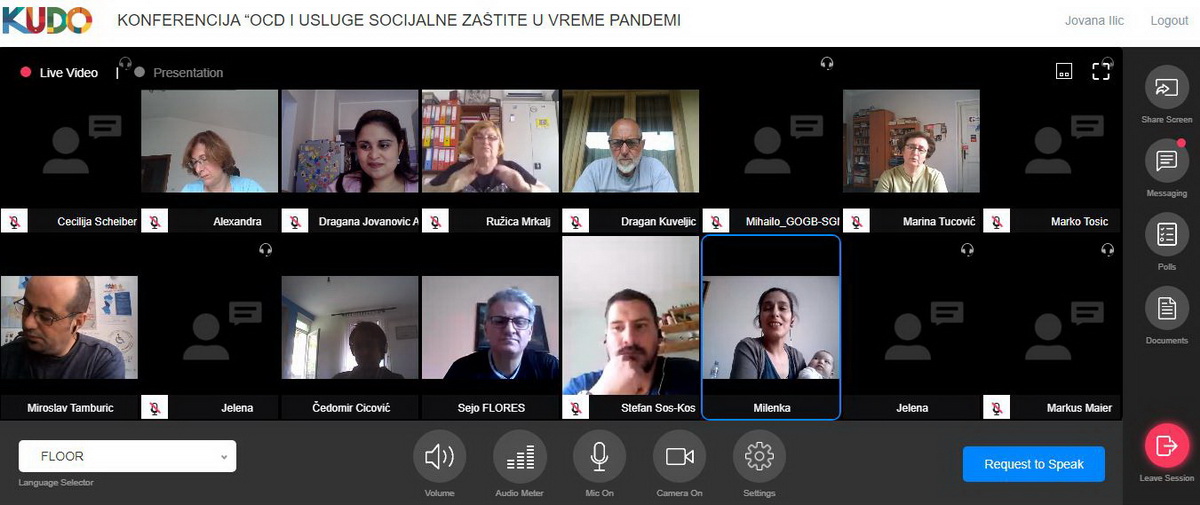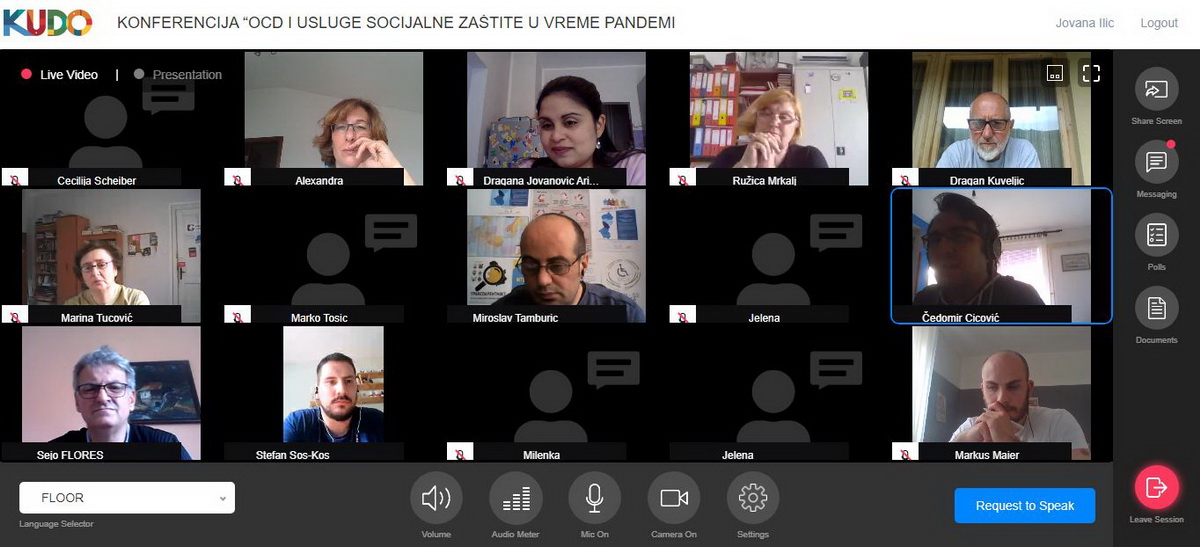 The online conference “Civil Society Organisations and the Social Protection Services during the Pandemic”, which was organised by the Social Inclusion and Poverty Reduction Unit of the Government of the Republic of Serbia (SIPRU), was held on 12 May 2020. The goal of the Conference was to present examples of good practice of civil society organisations (CSOs) during the pandemic and to highlight the issues that organisations face in their communities, the most important activities implemented during the pandemic (state of emergency), the current challenges, and challenges expected to arise in the coming period.
The online conference “Civil Society Organisations and the Social Protection Services during the Pandemic”, which was organised by the Social Inclusion and Poverty Reduction Unit of the Government of the Republic of Serbia (SIPRU), was held on 12 May 2020. The goal of the Conference was to present examples of good practice of civil society organisations (CSOs) during the pandemic and to highlight the issues that organisations face in their communities, the most important activities implemented during the pandemic (state of emergency), the current challenges, and challenges expected to arise in the coming period.
The Conference was organised as part of the project “Social Services for Vulnerable Groups”, which aims to support local governments in the establishment of local mechanisms for social inclusion of vulnerable groups by cooperating with CSOs, which is realised through the development of models for identifying and reaching the “Invisible” potential beneficiaries of the social protection services in the local community.
The project is implemented by SIPRU with the support of the German Agency for International Cooperation (GIZ) in 15 cities and municipalities throughout Serbia: Šid, Ruma, Sremska Mitrovica, Plandište, Pećinci, Krupanj, Loznica, Lajkovac, Mionica, Užice, Arilje, Priboj, Prijepolje, Kosjerić and Sjenica.
The Conference was opened by Alexandra Hilbig from the GIZ and Dragana Jovanović Arijas, SIPRU Manager. They thanked all the organisations that participated in the Conference for their work on implementing activities, as well as for their contribution to the efforts aimed at improving the framework for the provision of social services at the local level.
The working part of the conference was opened by the representatives of the organisations and institutions whose activities, implemented during the state of emergency, strived to reduce the damage and challenges faced by certain groups during the pandemic.
Cecilija Šajber from the Centre for Provision of Social Protection Services in Kikinda spoke about the experiences in providing two social services during the state of emergency in a town, which at the beginning of the crisis was considered to be one of the epicentres of the epidemic, as well as about the additional activities in the Nova Crnja municipality. As an example of good practice, she gave the solidarity action realised through the sale of the magazine “Liceulice” in Kikinda.
Marko Tošić from the Centre for Youth Integration joined the Conference from the Belgrade Drop-in Shelter and spoke about the challenges the Shelter encountered during the pandemic and warned about the problems that might arise in the coming period. “The Drop-in Shelter and the Café bar ’16’, a social enterprise established by this association, were closed in the middle of March, which caused significant problems for all users of their services, a particular problem being the fact that the users of these services are mostly children and young people living on the streets”, explained Marko. He emphasised that the biggest problem for the Shelter in the coming period will be the lack of food and funds for the realisation of classes.
Mihailo Gordić, the vice president of the City Organisation of the Deaf of Belgrade, spoke about the services ensured and provided by this organisation during the pandemic, with the most important service being the translation into the Serbian sign language through the Video Relay Centre COVID 19, and the accessibility of important information in Serbian sign language on television stations with national frequency (simultaneous translation and subtitled content). Mihailo also pointed out the problems encountered by deaf and hard of hearing people in everyday communication with institutions, which was a special challenge during the pandemic and noted that the organisation sent appeals and recommendations, as well as proposals to all relevant institutions providing them with the measures designed to improve the position of deaf and hard of hearing people during the state of emergency. As an example, he stated the necessity of providing tablet computers to deaf and hard of hearing people who use the Serbian sign language, in case they notice symptoms or they need to be hospitalised they would have to be able to communicate with health care providers working in health care institutions, COVID clinics, and hospitals. He added that the representatives of the Association of the Deaf and Hard of Hearing of Serbia also appealed to the Ministry of Finance regarding the adopted Decree on the establishment of a temporary register and the manner of payment of the one-time financial aid to all adult citizens, with the aim of adapting the process of applying for the one-time state financial aid to the needs of persons who are deaf or hard of hearing.
As a good example of responding to the needs of this vulnerable group, Mihailo cited the reaction of the B92 Foundation, which donated two tablets to the City Organisation of the Deaf of Belgrade, as well as the reaction of the television station B92, which responded to the objection regarding the squares on TV stations displaying the interpreters for deaf persons being too small, by correcting this technical detail, which was very significant for all deaf persons.
Dejan Mitić from the Association for Local Development of Kamenica spoke about the activities of this organisation in the Niš region. He gave several examples of activities performed by this organisation during the pandemic, such as disinfection of streets in rural areas, providing assistance to single mothers and children, supplying the Clinical Centre in Niš with products form local agricultural producers, and he also announced activities that will be supported by the Trag Foundation and the “Ana and Vlade Divac” Foundation. As a successful example, he mentioned the cooperation with the Safe House from Sombor, whose users started the production of protective masks during the pandemic, and after decided to reorganise this activity and establish a social enterprise.
As the Conference continued, representatives of other civil society organisations joined the discussion, pointing out the specifics of their local communities that reacted differently to the state of emergency and the declaration of a pandemic.
 Goran Reković from the association “PRIMUS” spoke about the specific characteristics of Priboj as an environment in which about 1900 citizens were isolated for 28 days due to the special circumstances of this municipality, where a large number of citizens cross the border with Bosnia and Herzegovina every day to go to work. “Small communities face a large number of problems and it is realistic to expect that a lot of services at the local level will be shut down”, said Goran and indicated the problem with the unclear functioning of city centres for the provision of services, noting that such a centre is also being established in Priboj.
Goran Reković from the association “PRIMUS” spoke about the specific characteristics of Priboj as an environment in which about 1900 citizens were isolated for 28 days due to the special circumstances of this municipality, where a large number of citizens cross the border with Bosnia and Herzegovina every day to go to work. “Small communities face a large number of problems and it is realistic to expect that a lot of services at the local level will be shut down”, said Goran and indicated the problem with the unclear functioning of city centres for the provision of services, noting that such a centre is also being established in Priboj.
The representative of the association “Women’s Centre” from Užice, Rada Gujaničić, spoke about the engagement of this organisation in the field of development of social entrepreneurship in cooperation with vulnerable groups. She presented the example of how this association reacted appropriately by managing to expand the SOS telephone service from a landline to mobile phones, which enabled this service to be uninterrupted and provided continuously during the pandemic. In addition, she spoke about the problem of there being only one safe house in the Zlatibor district, while the needs of the region for this type of service are, as she pointed out, significantly greater than that.
Dragan Kuveljić from the association Mašta (Imagination) from Prijepolje and Jelena Žunić Cicvarić from the association “Užice Child Rights Centre” spoke about their activities and work with children, who are seen as a particularly vulnerable target group during the period of restricted movement and state of emergency.
Stefan Marković, a volunteer from the association “SOS-KOS” from Kosjerić spoke about the activities of this organisation during the pandemic, pointing to the fact that personal resources were mostly used (in the first place personal car) during the state of emergency in Kosjerić because the organisation does not have a vehicle. During the pandemic, Stefan covered several thousand kilometres, distributing humanitarian packages to socially vulnerable categories of the population, which, having in mind the size and the mountainous terrain of the Kosjerić municipality, is an extremely great success.
Milenka Matić from “StartHab” from Kosjerić highlighted the need for providing support to citizens who have spent several weeks in quarantine, both because of isolation measures and because of the curfew. “In such conditions, it is quite realistic to expect an increase in the number of citizens who will need this type of support,” said Milenka.
On behalf of the Association of Persons with Cerebral Palsy and Polio from Užice, Čedomir Cicović announced the introduction of new services in Užice, despite the problems caused by the pandemic. He pointed out one of the problems people with disabilities may face in the process of applying for EUR 100 of one-time financial aid provided by the state, which is the fact that some citizens do not have full legal capacity, and therefore some of them do not have an ID card. Furthermore, he underlined transportation issues affecting both the users and those who provide services in Užice.
The Conference was closed by Dragana Jovanović Arijas, SIPRU Manager, who, based on all facts and experiences presented during the Conference, concluded that a new approach to local issues was necessary. “Challenges in large and small municipalities differ significantly and therefore need to be approached individually. The crisis opens a unique space for CSOs to show their capacities”, said Ms Jovanović Arijas and concluded that even though the pandemic was a new situation for everyone, support was not lacking and that it would be especially important that in the coming period we all remain open to cooperation, and try to provide as much support as possible.
 Government of the Republic of Serbia
Government of the Republic of Serbia















 pdf [271 KB]
pdf [271 KB]
Leave a Comment